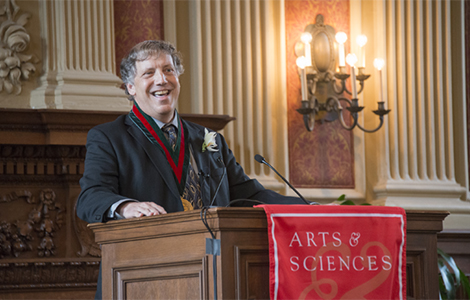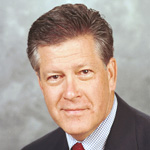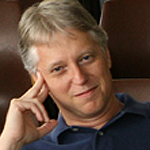
Steven Fazzari, PhD, a leading scholar on the relationship between rising income inequality and macroeconomic trends in the United States, will chair the recently re-established Department of Sociology in Arts & Sciences at Washington University in St. Louis, Barbara A. Schaal, PhD, dean of the Faculty of Arts & Sciences, has announced.
“Steve’s scholarly expertise and wide-ranging administrative experience make him the ideal person to lead the new department and I’m grateful for his willingness to take on this important role,” said Schaal, who also is the Mary-Dell Chilton Distinguished Professor in the Department of Biology in Arts & Sciences.
“A new department requires the strong leadership that Steve brings,” she said. “His work is building a strong foundation for our students and garnering support throughout Arts & Sciences and the university. The complex and troubling situation in Ferguson is a reminder of how urgently this work is needed.”
Schaal confirmed in March that the university would move forward with plans to re-launch the sociology department, which closed nearly 25 years ago. She has described sociology as an essential academic discipline that investigates important social issues at the heart of many of our most critical national and global challenges.
Fazzari, the inaugural Bert A. and Jeanette L. Lynch Distinguished Professor in Arts & Sciences, has been a member of the faculty since 1982. Other leadership roles include chair of the Department of Economics in Arts & Sciences; member of the Arts & Sciences Academic Planning Committee; and associate director of the Weidenbaum Center on the Economy, Government, and Public Policy. He earned a doctorate in economics from Stanford University.
As sociology chair, Fazzari sees his primary role as providing the internal leadership necessary to help the campus community develop a strong program that bears the distinctive stamp of Washington University.
“It will start out small, but this is a significant undertaking,” Fazzari said. “The university is making a serious academic commitment to this program. My job, along with my new colleagues that we will recruit in the next few years, is to make it exciting enough so that Arts & Sciences will want to build it out further.”
Leadership team
Fazzari is joined in this effort by two other campus leaders, Roddy Roediger, PhD, the James S. McDonnell Distinguished University Professor and dean of academic planning in Arts & Sciences, and Mark R. Rank, PhD, the Herbert S. Hadley Professor of Social Welfare at the Brown School.

Roediger has a longtime interest in returning sociology to campus, and some of his own research interests in how Americans remember their past intersect with interests of sociologists who study collective memory. As the dean of academic planning for Arts & Sciences, Roediger worked closely with Schaal to explore options for bringing sociology back to Washington University, and he chaired the campus advisory committee that led discussions on how to return sociology to the university. He serves with Fazzari as co-chair of the search committee to recruit new faculty for the department.
Rank is one of the country’s foremost experts on inequality and social justice. He earned his PhD in sociology from University of Wisconsin-Madison in 1984. He will serve as associate chair of the department and play an important role in its development.
“I couldn’t do this without Mark,” Fazzari said. “His disciplinary expertise is invaluable. I spend an hour or more every day talking with him about sociology.”
Fazzari served on the campus advisory committee that began meeting in 2013 to explore options for rebuilding the sociology program. He spent recent months attending national sociology conferences and gathering advice from leading sociology scholars.

Preliminary plans call for a slow but steady expansion of the sociology program, with two to three key faculty hires in each of the next five years. New courses could be offered as early as the fall 2015 semester.
Student interest
“I would have wanted to major in sociology had the department been in place when I began at WashU,” said Johannah Hansen, a sophomore from Madison, Wis. “Now I’m just hoping to take advantage of new course offerings in sociology, such as those that focus on underlying systems and structures that shape our society. Sociology is such a broad field, and I would love to see courses spanning topics from inequality to environmental sociology.”
For Hansen, the return of sociology is an indication that the university is placing the proper emphasis on the important social issues facing St. Louis and the nation.
“The recent events in Ferguson prove just how relevant a sociology department is for any university, and makes it that much more essential for ‘WashU in St. Louis’ to have an active department,” Hansen said. “I am happy to see that the university has recognized this gap in students’ education, and hope that the re-establishment of a sociology department is just one of several ways that Wash U and its students will begin to further address their roles and responsibilities in St. Louis.”
Faculty recruitment
While the program’s initial focus will be on undergraduate courses, development of a doctoral program in sociology is critical to long-term success, Fazzari said.
“The people that we hope to recruit — top scholars in the discipline — want to be some place where they can involve talented graduate students in their research and co-author journal articles with them,” Fazzari said. “Fortunately, there are plenty of graduate students and faculty in other departments and programs at Washington University who would be interested in getting involved in interdisciplinary research with incoming sociology scholars.”
Providing input on new faculty hires is an eight-member external advisory committee that is chaired by Douglas Massey, PhD, of Princeton University and includes some of the nation’s top sociology scholars. Fazzari has talked extensively with this group in recent months to develop a vision for the new department and discuss candidates for faculty positions.
Fazzari sees his background in economics, especially his interest in income inequality, as helpful to his new role in building a nationally recognized sociology program at Washington University.
“There is much overlap between the problems addressed by economics and sociology,” he said. “Economics also provides a firm grounding in technical modeling and data analysis thiat is part of much advanced work in many social sciences, including sociology. I am looking forward to exploring the linkages between economics and sociology as part of new interdisciplinary teaching and research projects with my new colleagues.”
Fazzari’s research explores two main areas: the link between macroeconomic activity and finance, particularly the financial determinants of investment spending; and the foundations of Keynesian macroeconomics.
Known as a gifted and popular teacher with several awards to his credit, Fazzari often collaborates with his students — past and present — on research projects and publications.
One such initiative is an innovative online resource called the “Muddy Water Macro,” a website where Fazzari and a team of students present well-organized, thoughtful, and broadly accessible ideas that they believe are central to understanding Keynesian economics.
One of his longest research collaborations has been with Barry Cynamon (AB ’05). Their recent research — widely cited in the national news media — suggests that growing economic inequality in the United States is an important factor affecting the nation’s slow post-recession economic recovery.
Fazzari will continue to teach economics as he explores options for developing his own cross-disciplinary course that delves more deeply into sociology.
He recently began co-teaching a course with Rank on the “Economic Realities of the American Dream,” which examines the American Dream’s historical meaning, the traditional pathways to achieving it, and its viability for the future.
The Department of Sociology recently launched its Arts & Sciences website. For more information about the activities of the new department, visit sociology.wustl.edu.